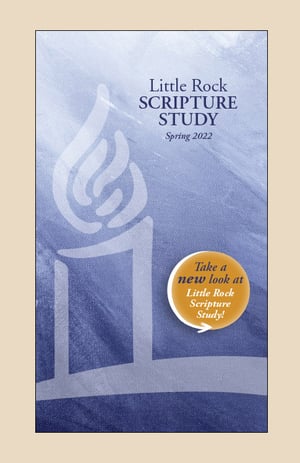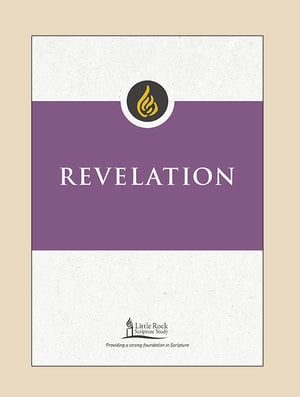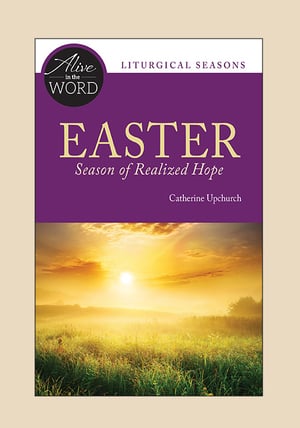During the Christmas season I’m sure you thought about angels. You saw them in crèches and on cards, trees, and TV specials. But did you ever wonder where our belief in angels originated or what we consider to be their purpose in God’s plan? Although I have served as a priest for many years, I never reflected on those questions until I set out to write Angels in the Bible for Little Rock Scripture Study. In this article I would like to share with you some of the answers that I discovered as I researched and wrote about angels.
Our belief in angels comes from Judaism. Angels are found in some of the earliest passages of the Hebrew Bible (Old Testament). However, their presence there is fluid and elusive. There are even some passages in which an angel who is speaking suddenly disappears from the narrative, and God suddenly appears in its place. In Exodus 3:2-6, for example, an angel addresses Moses from a burning bush. But as Moses approaches the bush, suddenly it is God who is speaking. I call this literary phenomenon “slippage” because without warning, an angel seems to “slip” into the person of God. “Slippage" blurs the distinction between God and the angel God sends—so closely aligning the two that they can seamlessly switch roles.
What does “slippage” tell us about the purpose of angels in God’s plan? It seems that the purpose of angels is to do what God does—to act as God would act and to speak as God would speak. Thus, in studying angels, we discover God’s own values and choices. When we study angels, we study God.
Consider the angel who appears to Hagar in the wilderness in Genesis 16. Hagar was the maid of Sarah, the wife of Abraham. Sarah was barren. God promised Abraham that Sarah would bear him a son, but Abraham and Sarah grew tired of waiting and decided to take the matter into their own hands. Sarah “gave” Hagar to Abraham, and Hagar became pregnant with Abraham’s child (as inappropriate as this seems to us, in biblical times, it was a common practice for a man to have a concubine if his wife was barren). Tensions soon arose between the pregnant maid and the barren mistress. Sarah treated Hagar so harshly that the maid fled into the wilderness. Sarah and Abraham’s plan to bypass God’s promise failed. The maidservant carrying the hoped-for heir became a wanderer in the desert, and Sarah was still barren.
Yet the story does not end in disarray. God sends an angel into the wilderness who directs Hagar to return to Sarah. The angel announces that Hagar’s son will be called “Ishmael” (meaning “God hears”) and will be the father of a great nation. By the end of the passage, the angel has “slipped” into God, who Hagar identifies as “the God who sees me” (16:13). Hagar then returns to Abraham’s house and safely gives birth to her son Ishmael.
What does the angel in this passage tell us about God? The birth of Ishmael was not a part of God’s plan; Ishmael was the result of Abraham and Sarah’s plan. Yet God intervenes to care for both Ishmael and Hagar. And as Genesis continues, God’s original plan comes to fruition. Abraham does have a son with Sarah and names him Isaac. Through Isaac, Israel becomes a great nation. But the most surprising and beautiful aspect of this story is that through it all, God does not forget Ishmael. God cares for the outcast child and loves him.
The angel who announces Ishmael’s birth shows us that God does not forget or reject the residue of our miscalculations. Our decisions may sometimes produce problematic outcomes: a friend who is alienated by our selfishness, a spouse who is suspicious because of our betrayal, a child who is born outside of marriage. But God supports the alienated friend, guides the suspicious spouse, loves the unexpected child, just as surely as God follows Hagar into the desert and provides for Ishmael’s future. An angel who is close enough to God to “slip” into God’s own self has assured us: when we make a mess of our lives, God is there to pick up the pieces.

George M. Smiga, STD, is a nationally known author and lecturer in Scripture and homiletics. A priest of the Diocese of Cleveland, Fr. Smiga serves on the faculty of St. Mary Seminary and Graduate School of Theology. He is the author of Little Rock Scripture Study’s Angels in the Bible and is currently working on a new Bible study for LRSS entitled The Holy Spirit in the Bible. Fr. Smiga writes a monthly column for Living with Christ and contributes regularly to Give Us This Day. Visit him at buildingontheword.org.
________________________________________________________________

“Our Bible study group just finished Angels in the Bible and wanted to let you know how much we have cherished this study. Fr. Smiga has made his biblical scholarship completely accessible, and his video lectures have been so helpful. We have thrashed out our former understandings about angels, become acquainted with many scriptural angelic references, and considered implications in our daily lives. Kudos to all involved!”
The Church of the Nativity Tuesday Morning Bible Study, Dubuque, Iowa











